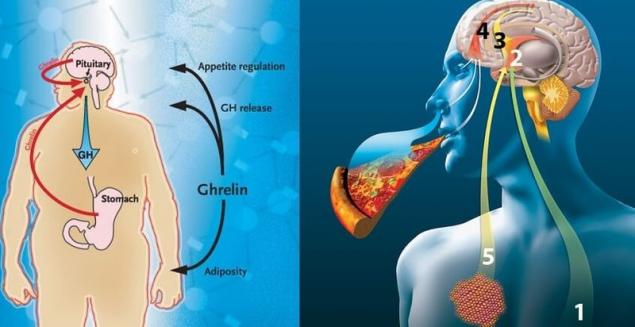597
Hunger hormone ghrelin: how thoughts can control the stomach!
Ghrelin is called the "hunger hormone"because in previous studies people who received this hormone, became so hungry that ate significantly more than usual.
Ghrelin may act on the "pleasure centers" in the brain, forcing you to reach back for another piece of pie just because you remember how delicious was the first and as you were pleased (at least at the moment).Simply put, one of the forces that cause you to eat (and overeat — a second helping or another dessert, even if you ate) is, without a doubt, ghrelin.

The level of this hormone in the body is affected by a completely different, more complex phenomenon. However, one of the most interesting findings to date is the ability of the mind to "circle the stomach around your finger" — and this leads to a sharp decrease of ghrelin even in the absence of abundant food.
Experiment "Mind over milkshake":the study participants were given a milkshake, which was 380 calories. The bottle was attached labels of two kinds. On some labels was written that in a milkshake — as much as 620 calories and the other — that the cocktail is only 140 calories. It turned out that the physical changes and the saturation level of the participants corresponded to what was written on the label, not what was actually in the bottle.
Those who thought that drinking a milkshake with a huge amount of calories, after consuming the drink experienced a sharp drop in the level of ghrelin, while those who believed that drinking "low-calorie" cocktail, fluctuations in the level of ghrelin was not observed.
However, participants from "high-calorie" cocktail felt greater satiety — this shows that "the saturation level of the participants corresponds to no actual nutritional value of what they consume, and the indicators in which they were sure."
Thus, it appears that the mind influences the level of ghrelin is more than nutrients that you consume, and this has serious consequences! A simple belief that the food you just ate nutrient may, in fact, to reduce the level of hunger hormone, and this has secondary effects on metabolism starts burning just eaten calories.
The researchers explain: "the Impact of food consumption on ghrelin may be psychologically mediated, and the mind greatly determines the physiological responses to food."
Why diet products don't help you lose weightThis study sheds light on another reason why diet foods so often fail to help people actually lose weight. Remember, when the participants drank the "healthy" cocktail (which was a sticker "no fat, no added sugar, low calorie"), the level of ghrelin remained relatively unchanged? This means that their bodies are not received signal about what they ate and they need to stop eating, and has not received any signal of their metabolism.

If the producers really wanted to help people to lose weight, then perhaps the label "high in fat and calories" would have a greater effect than advertising of dietary products, which is unlikely to form positive beliefs in most people.
Other studies also showed that the brain is not to cheat using the products sweet taste, but without the accompanying calories, for example, artificially sweetened. Experiments have found that sweet taste, regardless of its caloric content, enhances your appetite and causes the effect of insulin release.
Aspartame, was found to have most pronounced effect, but the same can be said of the other artificial sweeteners, such as Acesulfame potassium, Sucralose (Splenda) and saccharin.
Simply put, when you eat something sweet, the brain releases dopamine, causing a feeling of pleasure. Activated promotion centre in the brain. In addition, it releases leptin, a hormone regulating appetite. After absorbing a certain number of calories, he, in the end, tells the brain that you ate.
Conversely, when you eat something sweet, but not caloric (i.e. an artificial sweetener), the path of pleasure in the brain still activated by the sweet taste, but you can deactivate there is nothing, because the body is still waiting for the calories.
As a result, you overeat and ultimately gain weight.
What else affects the hunger hormone?Becoming more and more obvious that what makes people eat certain foods, and what gives them the signal to begin or stop there depends on many factors. One of them may be your beliefs about food, but there are others. Thus, the level of ghrelin increases chronic lack of sleep, so you can feel the hunger, but actually, you don't need to eat. This is likely one of the reasons why lack of sleep is fraught with set of superfluous weight.
A role in the fluctuations in the level of ghrelin may play a insulin. In one study tracked the level of ghrelin in eight adults without diabetes two hours after insulin injection. Shortly after the beginning of the introduction level of ghrelin began to decline. When the insulin infusion was stopped, levels of the hunger hormone began to rise and rapidly returned to normal.
Since it is already known that insulin increases leptin levels — the "obesity hormone" that tells the brain to reduce the appetite after a meal, these results indicate that insulin plays an important role in control of what you eat.
In other words, suppose that you eat a sweet dessert. Increases insulin production, because the blood sugar must be delivered to the cells and use it for energy. The consumption of this sugar increases the production of leptin, which regulates appetite and fat deposition, and reduces the production of ghrelin, which helps regulate food intake.
The idea is that when you eat, your body knows what it needs to feel less hungry. But when insulin production impaired (e.g. when insulin resistance), ghrelin levels remain elevated even after eating — this condition leads to chronic hunger (mostly hunger for carbs), excess food intake and undesirable weight gain.
Fructose also influences the level of ghrelinfructose is a cheap form of sugar used in thousands of food products and soft drinks, can disrupt human metabolism and is likely to lead to a crisis of obesity. This is because in the body fructose is split not in the way glucose and fructose are consumed today in large quantities, causing negative effects its use became more pronounced.
If someone tells you that "sugar — it's everywhere sugar," these people are very behind the times. It becomes increasingly apparent that the consumption of fructose, including corn syrup with high fructose, is able to dramatically increase the tendency to overeat. You see, glucose suppresses the hunger hormone ghrelin and stimulates leptin, which suppresses appetite. Fructose also does not affect ghrelin and disrupts communication in the brain and leptin, which leads to overeating.
Therefore, fructose promotes the recruitment of extra pounds, increase belly fat, insulin resistance and development of metabolic syndrome, not to mention the long list of chronic diseases that accompany these conditions. This is another example of the complex interactions of the hormones of hunger and the ability to regulate food intake.
However, the idea that consciousness and your beliefs about what you eat, also affects the level of ghrelin, a very exciting and deserves due attention. As reported by NPR:
"Our beliefs have value in almost all spheres, in all that we do," says Krum. — "How is a mystery, but I don't think we pay sufficient attention to the role of our beliefs in determining our physiology and our reality. We have a very simplified view on metabolism: calories came in, calories out. People don't want to think about what our beliefs also influence it," she said. "But it is!"
Best of all — a psychosomatic approach to weight loss, the study proven strategies that have helped people to lose weight and keep the results for at least one year, many of the strategies were emotional, including:
Another item is that many people are still avoiding foods that will lead to the feeling of satiety, which craves your mind – touchproduct as a full-fledged butter, coconut oil, nuts, avocados and other healthy fats. Of course, we are all different, but to most people it would be nice to aim for a diet with a high content of healthy fats (50-70% of calories), moderate amounts of high quality protein and plenty of vegetables.
Such a diet normalizes hormone levels (ghrelin, leptin and insulin) and gives the feeling of fullness and the mind and the body, and you do not need to struggle with feelings of deprivation, which is wreaking havoc on the hormone levels, hunger and metabolism.
In fact, research shows that the calories obtained from bread, refined sugars and processed foods promote overeating, whereas calories from whole vegetables, protein, and fiber decrease hunger. Not all calories are the same — that is why attempts to lose weight through calorie counting does not help, but proper nutrition helps. published
Author: Joseph Mercola
P. S. And remember, only by changing their consumption — together we change the world! ©
Source: russian.mercola.com/sites/articles/archive/2017/03/27/%D0%B3%D1%80%D0%B5%D0%BB%D0%B8%D0%BD-%D0%B3%D0%BE%D1%80%D0%BC%D0%BE%D0%BD-%D0%B3%D0%BE%D0%BB%D0%BE%D0%B4%D0%B0.aspx
Ghrelin may act on the "pleasure centers" in the brain, forcing you to reach back for another piece of pie just because you remember how delicious was the first and as you were pleased (at least at the moment).Simply put, one of the forces that cause you to eat (and overeat — a second helping or another dessert, even if you ate) is, without a doubt, ghrelin.

The level of this hormone in the body is affected by a completely different, more complex phenomenon. However, one of the most interesting findings to date is the ability of the mind to "circle the stomach around your finger" — and this leads to a sharp decrease of ghrelin even in the absence of abundant food.
Experiment "Mind over milkshake":the study participants were given a milkshake, which was 380 calories. The bottle was attached labels of two kinds. On some labels was written that in a milkshake — as much as 620 calories and the other — that the cocktail is only 140 calories. It turned out that the physical changes and the saturation level of the participants corresponded to what was written on the label, not what was actually in the bottle.
Those who thought that drinking a milkshake with a huge amount of calories, after consuming the drink experienced a sharp drop in the level of ghrelin, while those who believed that drinking "low-calorie" cocktail, fluctuations in the level of ghrelin was not observed.
However, participants from "high-calorie" cocktail felt greater satiety — this shows that "the saturation level of the participants corresponds to no actual nutritional value of what they consume, and the indicators in which they were sure."
Thus, it appears that the mind influences the level of ghrelin is more than nutrients that you consume, and this has serious consequences! A simple belief that the food you just ate nutrient may, in fact, to reduce the level of hunger hormone, and this has secondary effects on metabolism starts burning just eaten calories.
The researchers explain: "the Impact of food consumption on ghrelin may be psychologically mediated, and the mind greatly determines the physiological responses to food."
Why diet products don't help you lose weightThis study sheds light on another reason why diet foods so often fail to help people actually lose weight. Remember, when the participants drank the "healthy" cocktail (which was a sticker "no fat, no added sugar, low calorie"), the level of ghrelin remained relatively unchanged? This means that their bodies are not received signal about what they ate and they need to stop eating, and has not received any signal of their metabolism.

If the producers really wanted to help people to lose weight, then perhaps the label "high in fat and calories" would have a greater effect than advertising of dietary products, which is unlikely to form positive beliefs in most people.
Other studies also showed that the brain is not to cheat using the products sweet taste, but without the accompanying calories, for example, artificially sweetened. Experiments have found that sweet taste, regardless of its caloric content, enhances your appetite and causes the effect of insulin release.
Aspartame, was found to have most pronounced effect, but the same can be said of the other artificial sweeteners, such as Acesulfame potassium, Sucralose (Splenda) and saccharin.
Simply put, when you eat something sweet, the brain releases dopamine, causing a feeling of pleasure. Activated promotion centre in the brain. In addition, it releases leptin, a hormone regulating appetite. After absorbing a certain number of calories, he, in the end, tells the brain that you ate.
Conversely, when you eat something sweet, but not caloric (i.e. an artificial sweetener), the path of pleasure in the brain still activated by the sweet taste, but you can deactivate there is nothing, because the body is still waiting for the calories.
As a result, you overeat and ultimately gain weight.
What else affects the hunger hormone?Becoming more and more obvious that what makes people eat certain foods, and what gives them the signal to begin or stop there depends on many factors. One of them may be your beliefs about food, but there are others. Thus, the level of ghrelin increases chronic lack of sleep, so you can feel the hunger, but actually, you don't need to eat. This is likely one of the reasons why lack of sleep is fraught with set of superfluous weight.
A role in the fluctuations in the level of ghrelin may play a insulin. In one study tracked the level of ghrelin in eight adults without diabetes two hours after insulin injection. Shortly after the beginning of the introduction level of ghrelin began to decline. When the insulin infusion was stopped, levels of the hunger hormone began to rise and rapidly returned to normal.
Since it is already known that insulin increases leptin levels — the "obesity hormone" that tells the brain to reduce the appetite after a meal, these results indicate that insulin plays an important role in control of what you eat.
In other words, suppose that you eat a sweet dessert. Increases insulin production, because the blood sugar must be delivered to the cells and use it for energy. The consumption of this sugar increases the production of leptin, which regulates appetite and fat deposition, and reduces the production of ghrelin, which helps regulate food intake.
The idea is that when you eat, your body knows what it needs to feel less hungry. But when insulin production impaired (e.g. when insulin resistance), ghrelin levels remain elevated even after eating — this condition leads to chronic hunger (mostly hunger for carbs), excess food intake and undesirable weight gain.
Fructose also influences the level of ghrelinfructose is a cheap form of sugar used in thousands of food products and soft drinks, can disrupt human metabolism and is likely to lead to a crisis of obesity. This is because in the body fructose is split not in the way glucose and fructose are consumed today in large quantities, causing negative effects its use became more pronounced.
If someone tells you that "sugar — it's everywhere sugar," these people are very behind the times. It becomes increasingly apparent that the consumption of fructose, including corn syrup with high fructose, is able to dramatically increase the tendency to overeat. You see, glucose suppresses the hunger hormone ghrelin and stimulates leptin, which suppresses appetite. Fructose also does not affect ghrelin and disrupts communication in the brain and leptin, which leads to overeating.
Therefore, fructose promotes the recruitment of extra pounds, increase belly fat, insulin resistance and development of metabolic syndrome, not to mention the long list of chronic diseases that accompany these conditions. This is another example of the complex interactions of the hormones of hunger and the ability to regulate food intake.
However, the idea that consciousness and your beliefs about what you eat, also affects the level of ghrelin, a very exciting and deserves due attention. As reported by NPR:
"Our beliefs have value in almost all spheres, in all that we do," says Krum. — "How is a mystery, but I don't think we pay sufficient attention to the role of our beliefs in determining our physiology and our reality. We have a very simplified view on metabolism: calories came in, calories out. People don't want to think about what our beliefs also influence it," she said. "But it is!"
Best of all — a psychosomatic approach to weight loss, the study proven strategies that have helped people to lose weight and keep the results for at least one year, many of the strategies were emotional, including:
- Try not to eat in a state of negative emotions and stress
- To be responsible for their decisions
- To strengthen the sense of autonomy, intrinsic motivation and self-efficacy in the issue of weight loss
- To participate in a network of social support
Another item is that many people are still avoiding foods that will lead to the feeling of satiety, which craves your mind – touchproduct as a full-fledged butter, coconut oil, nuts, avocados and other healthy fats. Of course, we are all different, but to most people it would be nice to aim for a diet with a high content of healthy fats (50-70% of calories), moderate amounts of high quality protein and plenty of vegetables.
Such a diet normalizes hormone levels (ghrelin, leptin and insulin) and gives the feeling of fullness and the mind and the body, and you do not need to struggle with feelings of deprivation, which is wreaking havoc on the hormone levels, hunger and metabolism.
In fact, research shows that the calories obtained from bread, refined sugars and processed foods promote overeating, whereas calories from whole vegetables, protein, and fiber decrease hunger. Not all calories are the same — that is why attempts to lose weight through calorie counting does not help, but proper nutrition helps. published
Author: Joseph Mercola
P. S. And remember, only by changing their consumption — together we change the world! ©
Source: russian.mercola.com/sites/articles/archive/2017/03/27/%D0%B3%D1%80%D0%B5%D0%BB%D0%B8%D0%BD-%D0%B3%D0%BE%D1%80%D0%BC%D0%BE%D0%BD-%D0%B3%D0%BE%D0%BB%D0%BE%D0%B4%D0%B0.aspx























